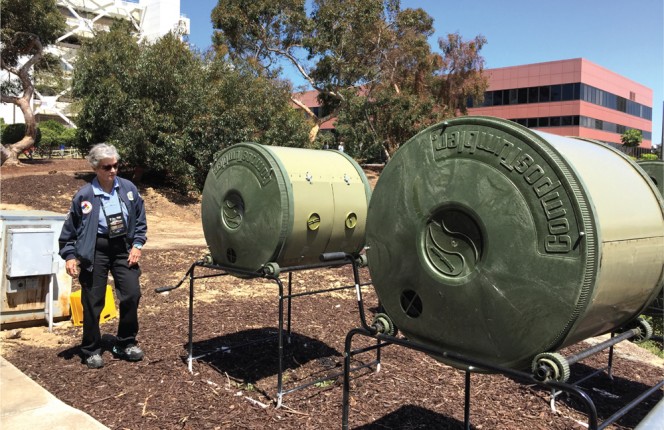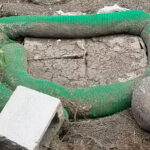BioCycle October 2015
San Diego, California: Veteran Affairs Health Care Composting
Jean Parkinson, director of Green Environmental Management Systems at the Veteran Affairs San Diego Healthcare System (VASDHS), has won the City of San Diego’s Director’s Recycling Award every year since 2007. In 2011, Parkinson began to focus on composting as well. “I learned that as much as 100 tons/year of food waste were being generated by the medical center, and knew something would have to be done about it,” she recalls. A composting pilot was approved and initially given approximately 5 acres on University of California at San Diego (UCSD) property used by the VASDHS. For feedstocks, Parkinson first targeted food waste from the hospital’s canteen kitchen, but it couldn’t be picked up frequently enough to prevent gnats from getting in. A switch was made to taking only the coffee grounds. In 2012, a farmers market selling organic produce opened on the VASDHS campus. Twelve 5-gallon buckets of vegetative food waste are collected weekly (12 tons/year) and combined with six 5-gallon buckets/week (6 tons/year) of coffee grounds from the canteen. VASDHS landscaping service contributes leaves and pine needles “but no more grass clippings, as we had to let the grass die because of the drought,” notes Parkinson.
Eventually, the composting pilot was moved closer to the hospital, and now operates on approximately two-tenths of an acre, due primarily to construction. Composting is done in six composting tumblers (each 68-inches high by 40-inches deep by 41-inches wide). The tumblers are turned five times a day; food waste and coffee grounds are added once a week. Parkinson is succeeding with her main goal of the pilot — to train veterans as Master Composters and grow a network of community gardens that will hire them. So far, six veterans have been trained, which includes six weeks of classroom instruction at the Living Coast Nature Center. They also are required to complete 30 hours of composting activities to qualify for a Master Composter Certificate. “Now we have 13 groups around San Diego County, including elementary schools and San Diego State, wanting to do community gardens and hire trained veterans,” notes Parkinson. The composting program produced 18.2 tons of compost last year, up from 12.5 tons in 2013. Some of the compost goes to the Wellness Rooftop Garden, where vets and staff can relax among potted trees and plants. Parkinson also has worm bins and gives away bags of worms, worm castings, and worm tea at the VASDHS Earth Day celebration and Safety Fair.
Plant the Flag Project, a 12-foot by 24-foot vegetable garden in the appearance of an American flag, is another pilot project. White eggplant was planted for stars and white cucumbers for stripes, red cabbage for red stripes and blue kale for background for the stars. “The veterans wanted to nurture something with the compost they create,” explains Parkinson. “Doing the compost is just manual labor, and the landscapers come and pick up the compost to use on the grounds, so they don’t get to see what it produces.” Veteran volunteers will harvest the vegetables after Veteran’s Day and enjoy the bounty of their labor.
North Sydney, Australia: Recycled Organics Use In Ag Program
The Center for Organic Research and Education (CORE) is a collaborative network supporting and promoting beneficial reuse of recovered organic resources in Australia. CORE recently introduced the Sustainable Amendments for Agriculture (SAFA) program to provide farmers who aren’t familiar with using recycled organic products with an opportunity to trial these products. CORE works with the farmer to appropriately utilize the material from delivery, to site, to application, including material preparation, application rates, spreading technology, soil analysis and yield benefits. An existing program, Sustainable Amendments for Rehabilitation (SAFR), demonstrates the benefits of using recycled organic materials for rehabilitation of quarries, mine sites, power facilities, and degraded industrial sites. Similar to SAFA, CORE provides an opportunity for site operators to test the products for soil rehabilitation and oversees the trial. It has a free service that links appropriate sites with available organic materials and site operators.CORE also monitors the stockpiling and use of the materials and provides soil development advice. http://www.core.asn.au
Pigeon Forge, Tennessee: Mixed Waste Facility Plans To Gasify Compost
In late August, Sevier Solid Waste, Inc. (SSWI) in Pigeon Forge engaged PHG Energy (PHGE) to build a biomass gasification plant to convert more than 30 tons/day of composted municipal solid waste into thermal energy and biochar. “This new installation will help us reduce the amount of compost we need to transport by converting it into a biochar, creating a new revenue stream for us,” notes Tom Leonard, director of SSWI. “The energy from the gasification system will be used in a thermal oxidizer promoting odor control in the buildings and will allow us to defer other upgrades. This represents a significant savings from our current disposal and operating costs.”
The SSWI composting plant, which utilizes rotating drums to separate incoming MSW, followed by composting indoors in aerated windrows, processes 79,000 tons of MSW and 11,000 tons of biosolids annually from Sevierville, Gatlinburg, Pigeon Forge and the Great Smokey Mountains National Park. SSWI plans on selling the residue, biochar, to a local industrial user as a renewable source of fuel to displace coal consumption. The cost of the facility is $2.25 million. The project has been awarded a $250,000 Clean Energy Tennessee Grant through the Tennessee Department of Environment and Conservation. PHG Energy anticipates start-up of the gasifier in the summer of 2016.














